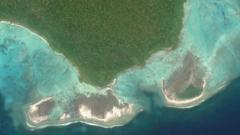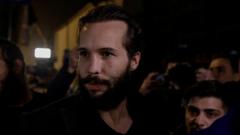The recent arrest of a US tourist trying to contact the Sentinelese tribe has prompted warnings about the threats posed by social media influencers to uncontacted indigenous communities, as calls for stronger protective measures grow.
Social Media Influencers: A Growing Risk to Uncontacted Tribes, Experts Warn

Social Media Influencers: A Growing Risk to Uncontacted Tribes, Experts Warn
Following the arrest of a US tourist on North Sentinel Island, advocates voice concerns over the influence of social media on uncontacted indigenous populations.
In a troubling incident underscoring the dangers faced by uncontacted indigenous people, a charity has issued a stark warning about the rising risk posed by social media influencers. This comes after Mykhailo Viktorovych Polyakov, a 24-year-old US tourist, was arrested for landing on North Sentinel Island, home to the reclusive Sentinelese tribe. The island, located in the Indian Ocean, is a protected area, inaccessible to outsiders to ensure the safety of its approximately 200 inhabitants, who are known to have no immunity against outside diseases.
Polyakov allegedly attempted to engage with the tribe by blowing a whistle and leaving offerings, including a can of Coca-Cola and a coconut, on the shore. According to the Andaman and Nicobar Islands police, they became aware of his actions after reviewing footage from his GoPro camera. The local police chief confirmed that Polyakov has been remanded for further questioning following his arrest.
Survival International, a group advocating for the rights of indigenous peoples, has condemned Polyakov's actions as "deeply disturbing" and potentially dangerous, not just for the tribe but for him as well. The organization advocates that the Sentinelese have repeatedly expressed their desire to live without outside interference. Jonathan Mazower, a spokesperson for Survival International, emphasized that this growing trend among influencers jeopardizes the communities they attempt to engage, as well as their safety.
This incident sheds light on the increasingly concerning intersection of social media culture and the preservation of vulnerable tribes. Mr. Mazower remarked on the fascination with uncontacted peoples that social media spurs, which adds to the already established threats of logging and mining faced by many tribal communities globally. He stressed the critical need for stronger protections for isolated indigenous groups, bolstered by commitments from international conventions that safeguard their rights.
The potential dangers of outside interaction with the Sentinelese are not theoretical; a previous attempt to contact the tribe ended tragically in 2018, when another US national was killed after landing on the same island. The recent events have reignited debates on the importance of protecting the autonomy and health of the world’s most isolated indigenous peoples, highlighting the need for effective measures to prevent further risky encounters.























